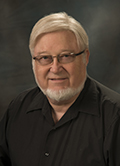NOTE: This week’s blog is a “Sermonette” which was originally published in The Tonkawa News Aug. 30, 2018. I liked it so much that I called Dr. Cope to ask if I could share it with you all. He graciously agreed.
Nowhere Else to Go
by Dr. Glen Cope, Tonkawa Church of Christ
 We live in an age of pluralism. Pluralism basically means that we have many optionfrom which to choose. We have TV packages that offer 100s of choices, but I only watch a few of them; they are my favorites. When I go to purchase ice cream, there are many options in flavors and sizes, but I usually stick to my favoirtes.
We live in an age of pluralism. Pluralism basically means that we have many optionfrom which to choose. We have TV packages that offer 100s of choices, but I only watch a few of them; they are my favorites. When I go to purchase ice cream, there are many options in flavors and sizes, but I usually stick to my favoirtes.
These choices are the right ones for me — they may not be your choice, but we say that’s okay; what’s right for me, is not necessarily right for you. That’s pluralism.
When it comes to religion many say we have lots of options as well. There are a lot of different “Christian” churches, and then there are many other religions in the world. Then we add in atheism, or skepticism, and humanism, or your favorite “ism” of the day. So, we have lots of choices.
But here’s the problem. What is “truth”? Pluralism tells us that truth is subjective. What is true for one person is not necessarily truth for another person. That may work with ice cream, but it does not work with “truth.”
In John chapter 6, Jesus had fed the 5,000, and in verse 15 we find that the crowd wanted to take Jesus to Jerusalem and make him king. Yes, they loved his miracles and the food, they loved his messages, but Jesus wasn’t ready for this type of kingdom. This wasn’t the truth.
Later when Jesus was back in town he began to teach them some hard things. In vs. 48 he says, “I am the bread of life.” But Jesus takes this further telling them that they must eat his flesh and drink his blood. We know Jesus was not speaking literally, but many seemed to take it that way. The Law of Moses prohibited eating and drinking blood as well as cannibalism. Verse 66 states that many of this DISCIPLES left him.
That was too much; that wasn’t what they thought was truth. Then in the next verses Jesus asks the twelve: “Do you want to go away as well?” Jesus was offering them the same option: If you don’t think this is the truth, the you can leave as well.” But Peter’s reaction shows that he knew the truth. Simon Peter answered him, “Lord, to whom shall we go? You have the words of eternal life, and we have believed, and have come to know, that you are the Holy One of God” (Jn. 6:68-69).
Peter knew he and the other disciples had “options.” He could go back to the scribes and Pharisees; he knew about the religions of the world. But he knew the truth.
Peter knew that truth was first, consistent and exclusive. It is impossible for opposite teachings to be right. If we say “yes” to Jesus then we must say “no” to all other religions and alternatives.
Second, truth is universal. Peter said: “We have come to believe that You are the holy one. We have come to believe that You are the One that gives eternal life.” Accepting Jesus is not like choosing you flavor of ice cream. When Jesus said, “I am the Way, the Truth and the Life; no man comes to the Father but by Me” (Jn. 14:6), He was excluding all other people who teach that they are the way to God. “No man comes unto the Father,” said Jesus, “but by Me.” By that statement, if it is true, and we believe that it is, all other religions are disqualified.
Third, truth is based on evidence. Peter said, “We have come to believe, and to know that You are the holy one of God.” God’s truth is established by the prophets, by Christ himself.
There is none other like Him – we know that He is the way, the truth, and the life and that through Him we are on the path to the Father.




